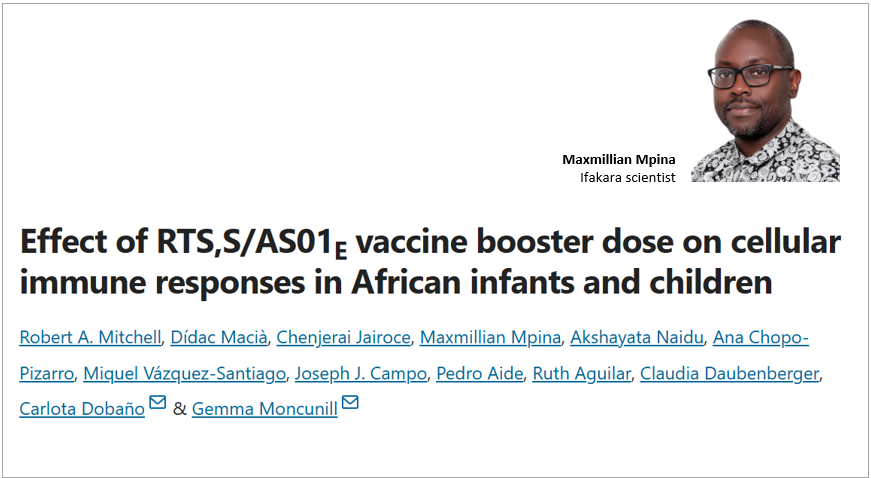
EVALUATION: Assessing progress, challenges of the first malaria vaccine - RTS,S

The first malaria vaccine to receive the World Health Organization (WHO) approval - RTS,S – has been a significant step forward in the fight against malaria. However, new findings underline the need to strengthen its impact. By examining the immune responses caused by the vaccine, scientists are uncovering opportunities to improve its effectiveness and durability.
The study, conducted among 709 children and infants from Bagamoyo, Tanzania, and Manhiça, Mozambique, evaluated immune system responses to a booster dose administered 18 months after the primary three-dose vaccination.
Scientists from Spain, Tanzania, Mozambique, and Switzerland measured 30 immune markers from the children’s blood samples and analyzed their association with malaria protection and antibody levels. Among the contributors was Maxmillian Mpina, a scientist from the Ifakara Health Institute, who, along with his colleagues, processed the samples and performed stimulations.
Booster dose moderately enhances protection
The findings, published in the Nature journal, show that while the booster dose moderately enhances immune responses, its effectiveness in reducing malaria risk remains partial, emphasizing the need for further advancements in vaccine development.
Key results indicate that specific immune responses remained active for up to a year after the booster dose. However, some responses were associated with an increased malaria risk, underscoring differences in the vaccine's performance across age groups and settings. Further findings also indicate that the booster dose helps to partially restore the vaccine’s efficacy but does not provide full protection.
Call for enhancing vaccine durability, efficacy
“Our findings align with previous studies indicating that a strong vaccine-induced IL-2 response likely provides the support necessary for a robust humoral and cellular response to control a pre-erythrocytic infection. However, RTS,S induced a relatively low IL-2 response overall that was undetected in many participants. Therefore, modifying the vaccine design and strategy to elicit a higher memory T cell response may increase vaccine durability and efficacy,” the study authors noted.
Malaria remains a leading cause of illness and death in many regions, particularly in sub-Saharan Africa. The findings of this study emphasize the importance of continuing research to enhance malaria vaccines, ensuring broader and longer-lasting protection for those most vulnerable.
Ifakara’s contribution in RTS,S development, evaluation
In the mid-2000s, Ifakara Health Institute evaluated the performance and safety of an earlier version of the RTS,S vaccine in Tanzanian infants. This included assessing the feasibility of incorporating the vaccine into WHO-recommended immunization programs. Early studies concluded that the vaccine had a good safety profile and reduced malaria infections in infants.
In later studies, Ifakara collaborated with the National Institute for Medical Research (NIMR) in Tanzania as part of a multi-center study involving a network of over 10 African sites. These studies evaluated the now-approved version of the RTS,S vaccine, which prevented a substantial number of clinical malaria cases in infants and young children, both with and without a booster dose.
As a result of these efforts, the RTS,S vaccine was identified as having great potential for malaria control, particularly when used in combination with other effective measures in high-transmission areas. The RTS,S/AS01 vaccine is now widely accepted for providing significant protection against both clinical and severe malaria in African children and was favorably reviewed by the European Medicines Agency several years ago.
The WHO Global Malaria Policy Advisory Group initially recommended pilot studies to assess the vaccine’s feasibility and safety when integrated into existing national immunization programs. Since then, over 800,000 children in Ghana, Malawi, and Kenya have received the vaccine, leading to its full endorsement by the WHO for use in areas of moderate to high transmission.
About the RTS,S vaccine
RTS,S/AS01 (RTS,S) is a vaccine targeting Plasmodium falciparum, the deadliest malaria parasite globally and the most prevalent in Africa. Developed in 1987 by scientists at GSK laboratories, the vaccine became a collaborative effort in 2001 when GSK and PATH, supported by the Bill & Melinda Gates Foundation, partnered to advance its development for infants and young children in malaria-endemic regions of sub-Saharan Africa.
In 2016, the WHO recommended pilot introductions of RTS,S in selected regions across three African countries. The vaccine is intended as a complementary malaria control tool, supplementing—not replacing—the core package of WHO-recommended preventive, diagnostic, and treatment measures.
Read the publication here.
